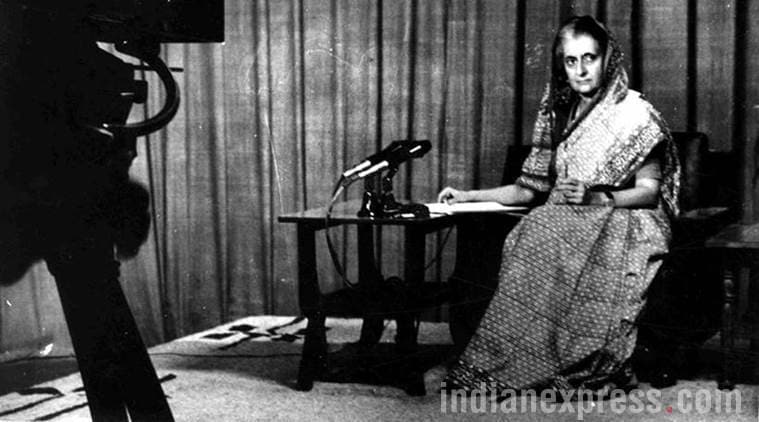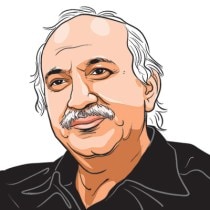From 1975 to 44
Emergency did not end dynasty in Indian politics. But it kicked off its journey into irrelevance

Former prime minister Indira Gandhi addressing the nation from the Doordarshan studio during Emergency. (Express archive photo/August, 1975)
Journalism, alas, is rarely about good news. When readers demand the “truth”, they are not looking for what went right; they are searching for what went wrong. And yet, over decades of reading, writing and editing, the most memorable news item I have read was an historic instance of good news.
It appeared on the front page of this newspaper, The Indian Express, 41 years ago. It was written by a journalist who had already become a headline-architect and has grown since then into a legend, Kuldip Nayar. The story was simple enough: The then Prime Minister, Indira Gandhi, had decided to hold general elections, already overdue, within a few weeks.
For today’s readers, who get more elections in a year than predecessors got in five, my elation might seem an overstretch. But if elections had not been held in 1977, there might not have been any elections today. For 19 months, Indian democracy had been brutalised to the point where it lay in a dangerous coma. The fundamental rights of India’s Constitution had been abandoned, democracy subverted. Between June 1975, when Emergency was imposed, and the announcement of elections, India was run as a dictatorship. Elements in dark corners of government had begun to talk of institutionalising this dictatorship. The stakes were as high as that.
Kuldip Nayar’s story did not offer assurances. But it did offer hope that we had heard the death rattle of this abusive Emergency, and an election could release us from this numbing bondage. The story was soon confirmed, making it the scoop of the century. In the March general elections, a stunned Mrs Gandhi was, unbelievably, defeated.
Unbelievable might, again, seem like an exaggeration. But consider, again, the facts. Congress had never been defeated in a national election; and in 1971 Mrs Gandhi had won a spectacular majority. Opposition parties had not done themselves any favours by splitting like an amoeba over the past decade. The nation was paralysed by a silent dread that it had neither experienced nor expected. Over 2,00,000 political activists, including almost every senior and junior Opposition leader, was in jail. Even Gandhian stalwarts and heroes of our Independence movement, like the venerable Jayaprakash Narayan [popularly known as ‘JP’],were behind bars. Censorship silenced media, fear choked people. The police became a threat to citizens, and the principal instrument in the implementation of terrifying schemes like forced sterilisation. Indians lost not merely their liberty, but their right to life. Niren De, Attorney General, told the Supreme Court that under Emergency, an Indian could be killed, arbitrarily, by the state. To his credit, he added that this “shocked his conscience” and hoped that it would shock the conscience of their Lordships as well. De must have been truly shocked to discover that four out of five Lordships hearing the case did not have a conscience. It was our Supreme Court’s darkest hour.
If the purpose of analogy is to heighten clarity through comparision, then the Emergency was the Jallianwala Bagh of free India. The people demanded freedom. They got a massacre of democratic rights.
After the first flurry of bewildered rage in June 1975, the media retired into a psychological retreat. A few crony editors mustered the gall to project censorship as the new normal, and a very few pseudo-intellectuals began to use eerie arguments to glorify Mrs Gandhi as the “saviour monarch”. But Indians sank into sullen depression.
Perhaps Mrs Gandhi was lulled by this surface silence, and felt she could win the unexpected election, which she could then trumpet as the ultimate justification for the Emergency. No one told her about the volcano bubbling beneath until the lavabegan to flow upwards in February, as the campaign gathered momentum. Mrs Gandhi missed an essential fact about 1977. Her challenge was not merely from political parties; it was from India. The people buried dictatorship in the avalanche of 1977.
The successor government, jumbled in an artificial club dubbed Janata Party, was neither as good as its advocates thought, nor as awful as its critics suggested. Too many of its leaders, however, had more amibition than scruples. Its lasting achievement was to ensure, through legislation, that democracy could not be usurped again by a coup from above.
Strangely, the Congress picked up what the people had rejected, and turned a party that had practised internal elections and shared power, into a dictatorial and dynastic outfit. Mrs Gandhi had been dominant; now she became an empress-figure (well captured by cartoons) who decreed that even succession should belong to her family. The Congress rationalised imperium as “necessity”.
There was a pause after the tragic assassination of Rajiv Gandhi in 1991; P V Narasimha Rao became Prime Minister and was succeeded by Sitaram Kesri as Congress president after he lost the general elections of 1996. When in the elections of 1998, Kesri delivered only 141 seats, he was dethroned as well. The party was restored to Sonia Gandhi as her “rightful due”. She won only 114 seats in the next general elections, less than Kesri, but no one dared to either criticise or challenge her. Dynasty, after all, is above the laws that dictate the fortunes of ordinary mortals. Today Congress has become family property. Dynasty cannot be questioned even if it brings the party only 44 seats in the Lok Sabha.
The step-by-step transition was publicly initiated by the Congress president during the Emergency, Dev Kant Barooah, a cipher on a seat once occupied by cynosures. He declared that Indira was India and India was Indira. In other words, without Indira there was no India.
Mrs Gandhi extended this logic to remain in office when she lost an electoral malpractice case in the Allahabad High Court in early June 1975. Instead of stepping down, she imposed Emergency upon the whole of India. This was the Indian version of the French Bourbons. King Louis XV famously said, “Apres moi, le deluge [After me, the deluge]”, before his kingdom was lost to a revolution. More pertinent is the remark made about the Bourbons after their temporary restoration in 1814: They learnt nothing, and forgot nothing.
The British Raj did not collapse immediately after Jallianwala Bagh; the vagaries of history permitted the British a last spell of stuttering survival. The Jallianwala Bagh of free India did not end dynasty in Indian politics. But it initiated a phase of stuttering survival till it winds its way towards irrelevance.
The writer is Union Minister of State for External Affairs
For all the latest Opinion News, download Indian Express App
More From M J Akbar
- Narrative of the forked tongueFrom Shah Bano to triple talaq, lies and deception are being used to cheat women of rights. It won’t work...
- For the Record: For an Islamic modernityFreedom, knowledge and gender equality have to be its pillars...
- Diary Item: Abandoning a kingdomIn football, the English miss the goalposts. In European politics, they miss the point...








































No hay comentarios:
Publicar un comentario